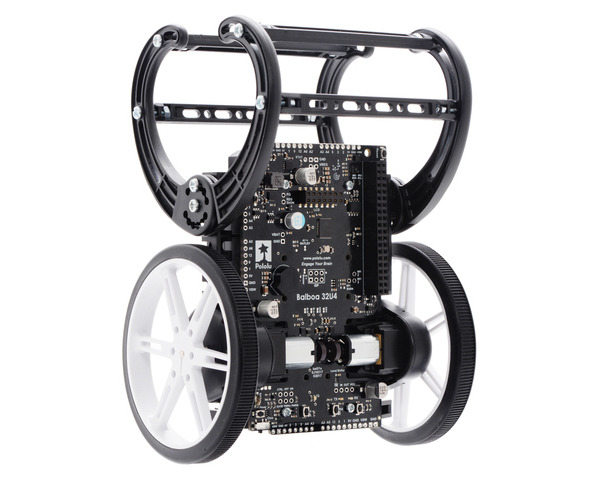Robot Kits » Balboa Robot and Accessories »
Balboa 32U4 Balancing Robot Kit (No Motors or Wheels)
Build your very own programmable balancing robot with the Balboa 32U4 robot kit! The Balboa control board features an Arduino-compatible ATmega32U4 MCU, motor drivers, quadrature encoders, and a full IMU. This board also has the ability to interface with a Raspberry Pi, making the foundation for a complete Raspberry Pi-controlled balancing robot. Motors and wheels are not included: choose your wheels and motors to personalize your robot.
 Compare all products in Balboa Robot and Accessories or
Compare all products in Balboa Robot and Accessories or  Raspberry Pi Expansion Boards or
Raspberry Pi Expansion Boards or  Robot Kits with Soldering.
Robot Kits with Soldering.
| Description | Specs (2) | Pictures (43) | Resources (24) | FAQs (0) | On the blog (12) | Distributors (34) |
|---|
Documentation and other information
-
Pololu Balboa 32U4 Balancing Robot User’s Guide (Printable PDF)
User’s manual for the Pololu Balboa 32U4 balancing robot.
File downloads
-
Pololu A-Star 32U4 drivers for Windows (version 1.3.0.0) (7k zip)
This download contains the Windows drivers for the A-Star 32U4 and the rest of our 32U4 family of boards.
-
Schematic diagram of the Balboa 32U4 control board (587k pdf)
-
Pinout and power distribution diagrams of the Balboa 32U4 control board (2MB pdf)
-
Gear ratio chart for the Balboa Chassis (447k pdf)
This printable 1:1 scale chart helps you identify the gears included in the Balboa 32U4 Robot Kit and Balboa Chassis Kit and details the available gear ratios.
-
Dimension diagram of the Balboa 32U4 Control Board (471k pdf)
-
Dimension diagram for the Balboa 32U4 Balancing Robot Kit (734k pdf)
-
Dimension diagram of the Bumper Cage Kit for Balboa 32U4 Balancing Robot (152k pdf)
-
Balboa Bumper Cage assembly reference diagram (2MB pdf)
Note: all angles shown assume the use of 80mm wheels.
-
3D model of the assembled Balboa Balancing Robot (24MB step)
Note: this model includes micro metal gearmotors and 80mm wheels that are sold separately from the Balboa 32U4 Balancing Robot Kit. This model uses a simplified model of the Balboa 32U4 Control Board to reduce the file size.
-
3D model of the Balboa 32U4 Control Board (27MB step)
Note: this model includes an LCD and headers that are sold separately from the Balboa 32U4 Balancing Robot Kit.
-
Drill guide for the Balboa 32U4 Control Board (285k dxf)
This DXF drawing shows the locations of all of the board’s holes.
-
LSM6DS33 datasheet (1MB pdf)
Datasheet for the ST LSM6DS33 3D accelerometer and 3D gyroscope.
-
LIS3MDL datasheet (2MB pdf)
Datasheet for the ST LIS3MDL 3-axis magnetometer.
Recommended links
-
Balboa 32U4 Arduino library
The Balboa32U4 library for the Arduino IDE helps interface with the on-board hardware on the Balboa 32U4 control board as well as the optional 5-channel reflectance sensor array for the Balboa.
-
Balboa 32U4 library documentation
-
LSM6 library for Arduino
An Arduino library for interfacing with the LSM6DSO and LSM6DS33 accelerometer and gyro ICs.
-
LIS3MDL library for Arduino
An Arduino library for interfacing with the LIS3MDL magnetometer.
-
Forum post: Correcting the Balboa magnetometer
Pololu forum user Jim Remington has shared a technique for compensating for hard iron distortion of the Balboa’s magnetometer. After corrections, he was able to create a compass program with a basic accuracy of ±2°, sufficient for navigating the Balboa around the room.
-
Arduino Software
Arduino integrated development environment (IDE) software
-
minimu9-ahrs software for Raspberry Pi
This is a program for reading sensor data from Pololu IMU boards over I²C. It was written for and tested on the Raspberry Pi, but it will probably also work on similar embedded Linux boards that support I²C.
-
Beefy arms for Balboa
These 3D-printable support arms for the Balboa robot are a fun add-on that can help protect the robot’s electronics from damage if it falls over or runs into an obstacle.
-
A-Star repository on GitHub
This repository contains Arduino add-on files, Windows drivers, and bootloaders for the A-Star 328PB, A-Star 32U4, and the rest of our 32U4 family of boards.
-
ATmega32U4 documentation
Microchip’s product page for the ATmega32U4 AVR microcontroller, with links to its datasheet, application notes, and other resources.











































